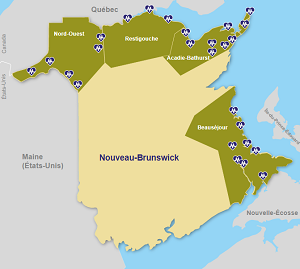One-at-a-Time Therapy for Children and Youth: Quick Access to Mental Health and Addiction Services
Moncton, January 6, 2023 – The one-at-a-time therapy model, also known as single session therapy, has now been implemented by all Child-Youth Teams in New Brunswick. This new approach is designed to improve accessibility to mental health and addiction services for children, youth and their families.

Jessica Dufour Ouellet, Clinical Lead OAAT, Child & Youth Teams, Zone 1B
Previously, clients went through an information collection and assessment process before being added to a wait list until services were available. The process has been streamlined and therapeutic intervention is now offered at first contact.
The initiative has yielded convincing results. The number of patients on the wait list within Vitalité Health Network decreased by 66% from May to November 2022.
"We know that most children and youth will not need more than three sessions. It is especially important to meet their needs as they arise, when their motivation to make changes is the strongest," emphasizes Carole Gallant, Regional Director of Mental Health and Addiction Services for Children and Youth.
"The key is to prioritize early access to care and recognize that significant change can occur during a single session. The goals of the moment are addressed, and the client leaves with a plan. Early intervention can prevent more serious mental health and addiction issues."
This service can be provided on a walk-in basis or by appointment. The session can take place in person, via videoconference, or by phone.
Just like in health clinics, clients can return at any time if they feel they need to, but no follow-up appointment is scheduled. The session can, however, serve as a point of referral to more specialized or intensive services or other resources.
The Network has 14 Child-Youth Teams comprised of nurses, social workers and psychologists. More than 400 education and health professionals received training and nine social worker positions were added to deliver this new model developed at Memorial University in Newfoundland and Labrador.
"Participation in this intervention model significantly reduced feelings of anxiety and concern for most children, youth and families," says Carole Gallant. "Early intervention and quick access to services are critical components of risk reduction and suicide prevention."
Single session therapy for adults was also rolled out in all the Network’s community mental health and addiction services centres, which reduced the wait list by 54%.
Access to addiction and mental health services is one of five action areas in the provincial health plan, Stabilizing Health Care: An Urgent Call to Action.

